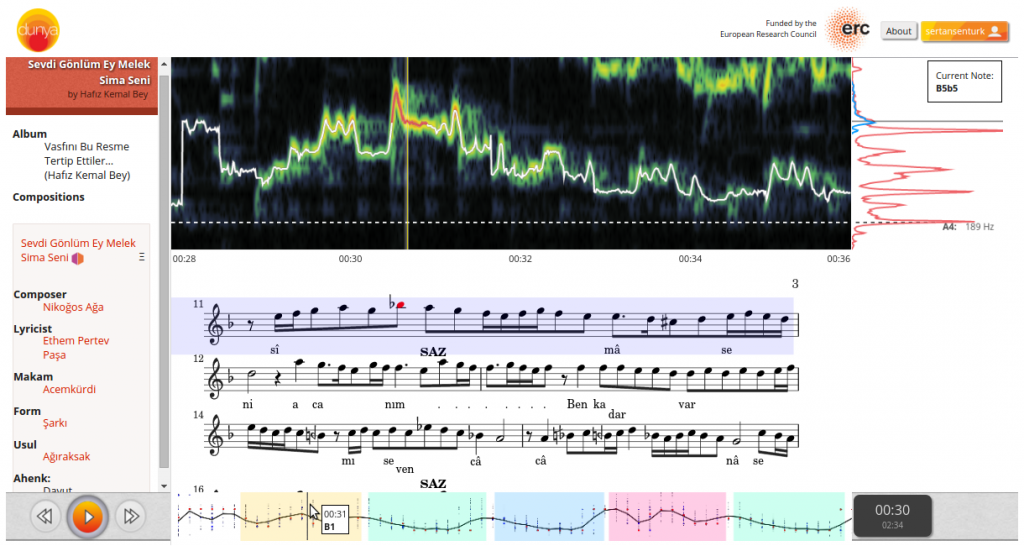 Culture-aware music description and discovery application, Universitat Pompeu Fabra
Culture-aware music description and discovery application, Universitat Pompeu Fabra
Carried within CompMusic project
Supported by European Union Seventh Framework Program (FP7/2007-2013), European Research Commission grant agreement 267583
Website: http://dunya.compmusic.upf.edu/makam/
Source code: https://github.com/MTG/dunya
Short Description
Dunya is a web-based ecosystem, which comprises the music corpora and related software tools that have been developed as part of the CompMusic project. These corpora have been created with the aim of studying particular music traditions and they include audio recordings plus complementary information that describes the recordings. Each corpus has specific characteristics and the developed software tools allow to process the available information in order to study and explore the characteristics of each musical repertoire. It is accesible via http://dunya.compmusic.upf.edu/.

Dunya stores the musical data such as audio recordings, music scores, relevant metadata (fetched from Musicbrainz) and automatic description extracted from these information sources. It also submits analysis tasks and manages the stored data (including automatic description) from the administration panel. In the visual interface, the extracted features and analysis results are shown in an audio player, which renders the music score and the audio representation synchronous to the playback.
All the data and technologies in Dunya are open with the exception of commercial audio recordings. The data can be accessed from the Dunya API. Playback is restricted to the users, who have registered to Dunya for research purposes.
Responsibilities
- Built (supported by musicians and other researchers) the largest corpus of Ottoman-Turkish makam music available for computational research. The corpus is hosted at http://dunya.compmusic.upf.edu/makam/
- Developed signal processing and machine learning based, novel methodologies to automatically describe audio recordings and music scores. The methodologies are described in my PhD thesis.
- Implemented the proposed methodologies and the current state-of-the-art in Python within a modular, easy-to-use and open source toolbox called tomato (https://github.com/sertansenturk/tomato).
- Assisted the development of Dunya by taking part in defining the use-cases, assisting the deployment of tomato to the web application and providing feedback on the user interaction
Publications
- Şentürk, S. (2016). Computational Analysis of Audio Recordings and Music Scores for the Description and Discovery of Ottoman-Turkish Makam Music. PhD thesis, Universitat Pompeu Fabra, Barcelona, Spain.

- Şentürk, S., Ferraro, A., Porter, A., and Serra, X. (2015). A tool for the analysis and discovery of Ottoman-Turkish makam music. In Extended Abstracts for the Late Breaking Demo Session of the 16th International Society for Music Information Retrieval Conference (ISMIR 2015), Málaga, Spain, 2015



- Atlı, H. S., Uyar, B., Şentürk, S., Bozkurt, B., and Serra, X. (2015). Audio feature extraction for exploring Turkish makam music. In Proceedings of 3rd International Conference on Audio Technologies for Music and Media (ATMM 2015), pages 142–153, Ankara, Turkey.


- Uyar, B., Atlı, H. S., Şentürk, S., Bozkurt, B., and Serra, X. (2014). A corpus for computational research of Turkish makam music. In Proceedings of 1st International Digital Libraries for Musicology Workshop (DLfM 2014), pages 57–63, London, United Kingdom.



- Sordo, M., Koduri, G. K., Şentürk, S., Gulati, S., and Serra, X. (2012). A musically aware system for browsing and interacting with audio music collections. In Proceedings of 2nd CompMusic Workshop, pages 20–24, Istanbul, Turkey.

